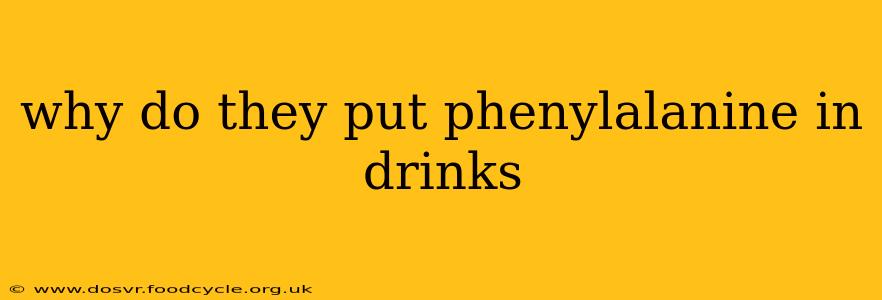Why Do They Put Phenylalanine in Drinks?
Phenylalanine, an essential amino acid, isn't typically added to drinks directly as a standalone ingredient in the way you might find vitamin C or electrolytes. Its presence in beverages is usually indirect, stemming from the use of natural or artificial sweeteners, or as a component of protein-containing products. Let's explore this further.
What is Phenylalanine?
Before delving into its presence in drinks, it's crucial to understand what phenylalanine is. It's one of the nine essential amino acids, meaning our bodies can't produce it; we must obtain it through our diet. Phenylalanine plays a vital role in protein synthesis and the production of several important neurotransmitters, including dopamine and norepinephrine, which affect mood, sleep, and cognitive function.
Aspartame and Phenylalanine
The most common reason you might find phenylalanine listed in a beverage's ingredients is due to the presence of aspartame. Aspartame is an artificial sweetener, and it's composed of two amino acids: aspartic acid and phenylalanine. Because aspartame is used extensively in diet sodas and other sugar-free drinks, phenylalanine is indirectly present in these products. This is crucial to note for individuals with phenylketonuria (PKU), a rare genetic disorder that prevents the body from breaking down phenylalanine. People with PKU must carefully monitor their phenylalanine intake to avoid serious health complications.
Other Potential Sources
While aspartame is the main culprit, phenylalanine can find its way into beverages through other means, though less common:
-
Protein-enhanced drinks: Some protein shakes or functional beverages contain added protein, which inherently consists of amino acids, including phenylalanine. The amount will vary significantly depending on the product and its protein source.
-
Naturally occurring phenylalanine: Certain fruit juices or plant-based drinks might contain small amounts of phenylalanine naturally, though this is usually a negligible quantity compared to those sweetened with aspartame.
Is Phenylalanine in Drinks Harmful?
For most people, the amount of phenylalanine found in beverages is not harmful. However, as mentioned previously, individuals with PKU must strictly limit their intake. Beyond PKU, excessive consumption of aspartame, and consequently phenylalanine, has been a subject of debate, with some research suggesting potential links to various health issues. However, the overwhelming scientific consensus is that aspartame is safe for consumption within the acceptable daily intake established by regulatory bodies like the FDA.
How much phenylalanine is in different drinks?
The amount of phenylalanine varies wildly between drinks. Diet sodas using aspartame will contain significantly more than a protein shake or a natural juice. Always check the nutrition label for the specific phenylalanine content, especially important if you have PKU or have concerns about phenylalanine intake.
Where to find more information?
For detailed information regarding phenylalanine and PKU, it's best to consult your physician or a registered dietitian. For information on aspartame and its safety, reputable sources such as the FDA website offer comprehensive insights.
In conclusion, the presence of phenylalanine in drinks is primarily linked to the use of aspartame as a sweetener or from the naturally occurring amino acids found in protein-containing drinks. While generally safe for most people, awareness of its presence and potential concerns, particularly for individuals with PKU, is crucial.
